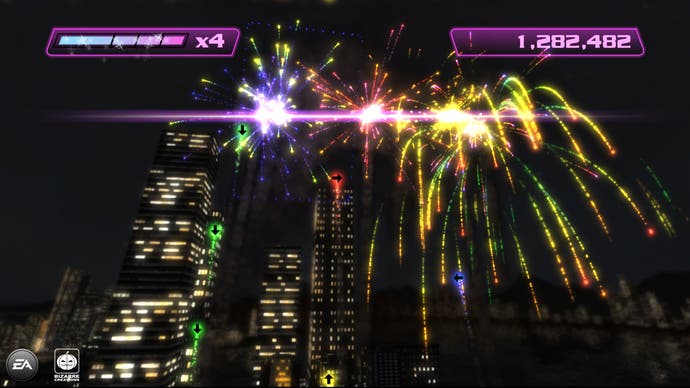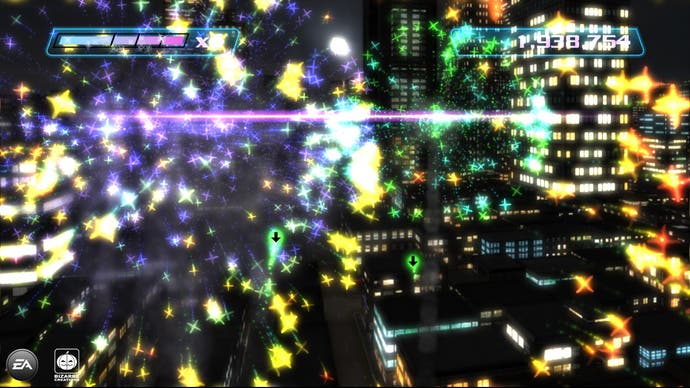Boom Boom Rocket
Lacks spark.
Where next for rhythm action? We've already got guitars, drums, bongos, microphones and carpets with arrows on clogging up our front rooms. We've got dancing pointers on the DS. Even the PSP has a good rhythm action game. None of you bought it, but it does have one.
If anyone can figure it out, surely it's Bizarre Creations, the company whose last Xbox Live Arcade game was so good and so cheap that it made all the other Xbox Live Arcade games look like overpriced derivative nonsense - including the ones that weren't overpriced derivative nonsense. Boom Boom Rocket, developed from an idea thought up at Electronic Arts, is their solution, promising to inherit the simplicity and obsession with high scores that made Geometry Wars so good.
This it has done. It's so basic that you can play it with one hand. As the camera circles around bulky skylines, fireworks with arrows on ascend toward a purple line that runs the length of the screen. When an arrow passes through the line, you press one of four corresponding buttons depending on the direction it's pointing. High scores are borne of better timing and the use of "bonus runs", time-limited multipliers that massively increase the points you get for each match. Like all the best rhythm action games, success is relatively easy to come by, but actual mastery requires practice, concentration, timing, and learning where best to target your bonus runs.

Like Geometry Wars, there's a visual payoff. Fireworks light up the sky in brilliant colours and increasingly elaborate displays, which are improved by the addition of new firework designs, unlocked as you complete levels on each of the three difficulty settings. When you activate a bonus run, the whole city finds itself embossed in throbbing greys, and the fireworks start putting more effort in.
Each level is built around one piece of music, and while they're all new, composed by a Mr Livingstone (we presume, and EA's press site confirms), they're all derived from well-known classical tunes. There's William Tell, the 1812 Overture, Ride of the Valkyries, and seven others. The beat-matching takes on regular patterns, as it should, allowing you to navigate certain sections instinctively, and as the difficulty increases, so too does the complexity and the rapidity of the fireworks. As you graduate to Medium and Hard versions of the levels, you have to hit multiple buttons at the same time.
BBR also distinguishes itself in the manner of the rockets' ascension. Unlike the Dancing Stage games, these arrows fly at the line from all angles and speeds, forcing you to pay attention to their progress while the music guides your timing. Although ostensibly 2D, with the camera dancing through the sky the trajectories appear to change fluently, and the gameplay avoids the feeling of rigidity that sometimes seeps from its contemporaries. Those who want to be challenged further can also turn to Endurance levels, where you do "laps" of each tune as the tempo increases by a beat-per-minute every few seconds. There are online leaderboards for everything, of course, and there's already some fierce competition for the top scores on each track in standard and endurance modes, while those of you who prefer to play against yourself can gun for higher ranks, and unlockable gamerpoints built around their collection.

The Achievements are pretty standard, though. There's nothing to compare to Geometry Wars' celebrated "Pacifism", which turned the game on its head by telling you not to fire, and to stay alive for 60 seconds while the screen filled up with enemies. The lack of a successor hardly undermines the new game, but it is symptomatic of a wider problem: Boom Boom Rocket is a bit behind the times, and there's nothing particularly distinctive about it.
Graphically it's missing something to compare to Geometry Wars' gorgeous undulations. Aurally it's novel, but you won't be rushing out to buy the songs. And in gameplay terms it has no real kick. Beat-matching is fundamentally compulsive. When it's done right, your fingers start to bypass your brain and react to the prompts like magic. But the best games in the genre have taken this and thrust it in new directions. Even before Guitar Hero, Harmonix had us dancing across an interstellar fret board in FreQuency and Amplitude; Gitaroo Man used directional movement; Ouendan and Elite Beat Agents did away with a bar and used the DS' touch-screen to put the emphasis on position and movement. Even the better games with fancy peripherals aren't reliant on them; the ones that are, like Donkey Konga, are ultimately short-lived.
As such BBR is a bit regressive. It's satisfying to play, and certainly proves to be enjoyable and challenging in all the right ways. It also has a two-player mode (sadly not playable over the Internet). The level design makes it apparent that Bizarre has figured out how a rhythm action game should work. But it doesn't build on the developers' aptitude for evolving gameplay, instead focusing on incidentals like fireworks, which aren't incentive enough to continue. The result is that while it never struggles to be entertaining, it never really stands out either, and ultimately proves rather forgettable. Worth a go, then, but you wouldn't write songs about it.


